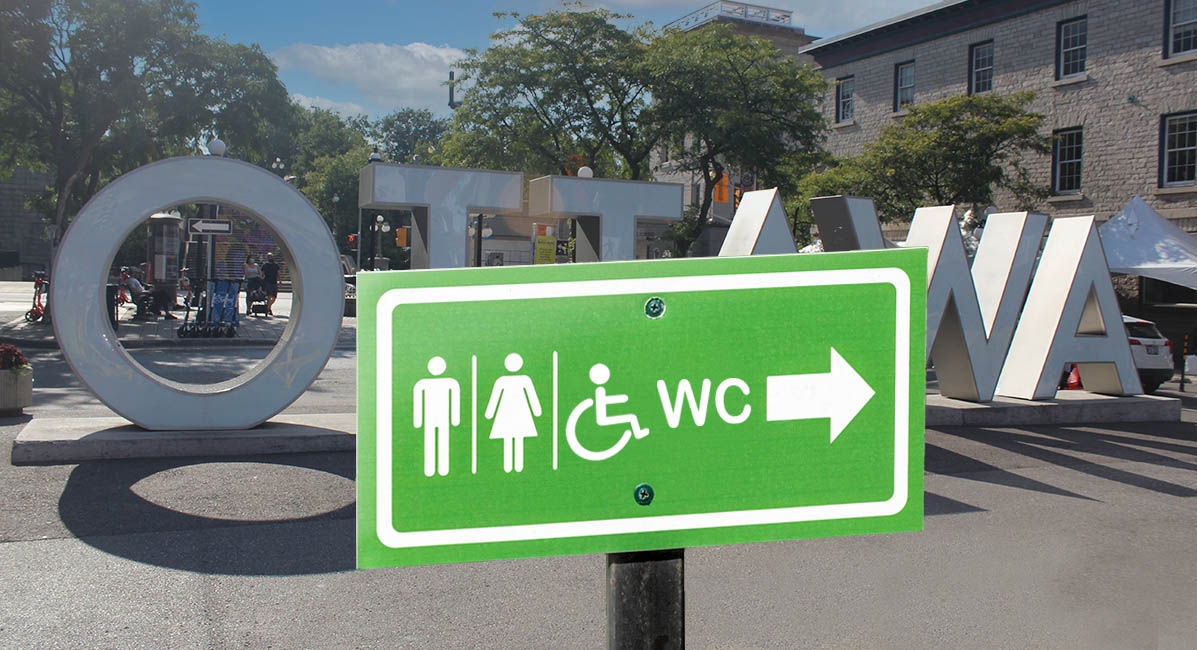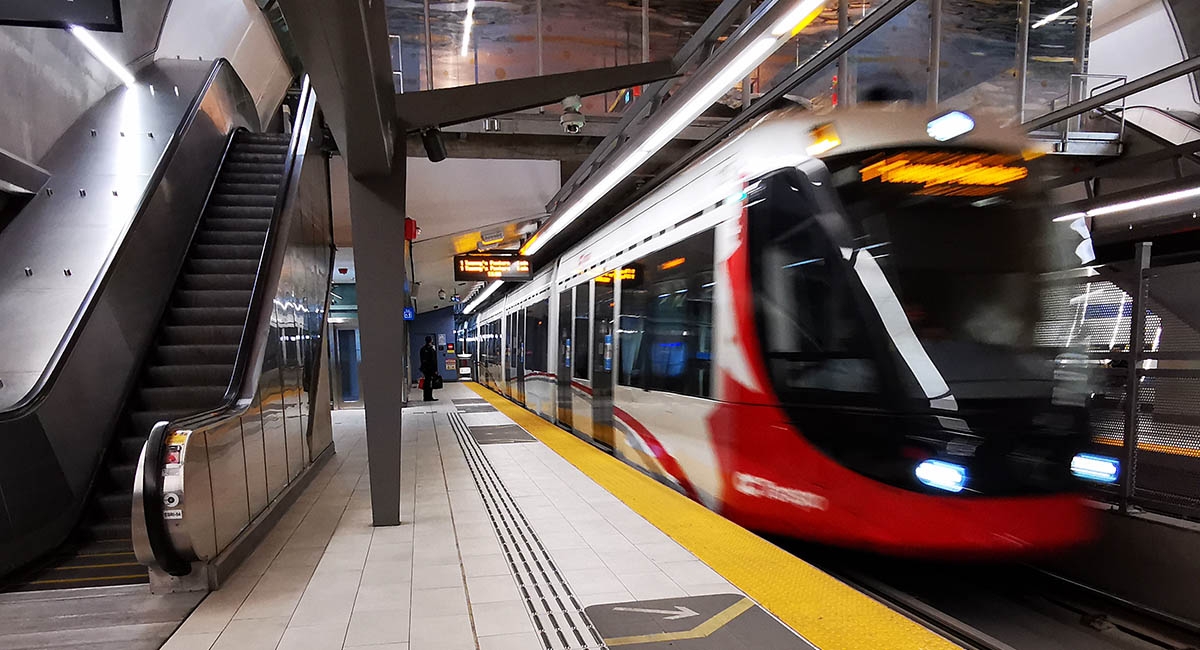
GottaGo! calls on NCC and Ottawa Public health to make public washrooms available in Ottawa
by Reuel S. Amdur
It was at the height of the corona virus lockdown. I was shopping for sausages and cheese in the ByWard Market when my guts began to growl. Where to go? ByWard Market Square, with its toilet facilities, was locked tight. I tried the building housing Le Droit and a group of shops, only to be driven out by the security guard. The Rideau Loblaw’s was my last hope. After all, in the past when shopping there I was allowed to use the facilities. Not this time. The COVID-19 situation had led businesses to put their toilets off limits to customers and the general public. I gave up, went home in my car, cleaned up a mess, and changed my underwear.
The Loblaw’s experience was only one situation. A number of places have changed their policies to put toilets off limits to customers, not even considering the general public, even eating places. Bagel shops that I occasionally visit, places with sit-down tables, now bar their restrooms to customers. McDonald’s and Tim Horton are companies that have bucked this unfortunate trend.
Recently, I ran across a group dedicated to doing something about the problem that I and undoubtedly many others faced. It is called GottaGo!, and here it is its story.
Back in 2013, Joan Kuyek was taking her granddaughter to a splash pad. The child needed to go to the toilet, but there was none to be had. Kuyek was not one to leave such a matter alone. That was the beginning of Gotta Go!, an advocacy group dedicated to improving availability of public washrooms in Ottawa.
I met with Elizabeth (Betta) Whitmore to learn more about the group. Participants are all volunteers, among them a bunch of engineers and social workers. Betta, a social worker, has supervised students on placement to work with the group, and now they have been able to hire two part-timers funded by the Ottawa Community Foundation, for some specific tasks.
They have a website, www.ottawapublictoilets.ca, where their efforts and other matters related to public toilets are discussed. The website provides photographs of some aesthetically tasteful public toilets in Japan and New Zealand.
GottaGo! has gained the support of a number of business associations, the Federation of Citizens’ Associations, the Coalition of Community Heath and Resource Centres, Shepherds of Good Hope, and the Social Planning Council. This list is not exhaustive.
GottaGo! calls for “a network of safe, accessible, free, clean and environmentally responsible public toilets and fountains in parks, major transit stops and key public places to meet the needs of residents and tourists in Ottawa.” Its website talks about safety, vandalism, and cost.
Briefly, a self-cleaning toilet such as found in Montreal would be in the $250,000-$300,00 range. The Portland loo runs around $150,000, while a composting toilet runs in the neighborhood of $50,000. GottaGo! says that the last-named is “suitable for playgrounds and nature pathways.” There are pro’s and con’s for different types. GottaGo! spells out some potential problems with the self-cleaning type, especially in case of need for maintenance work. This observation shows the advantage of having engineers on board.
Safety may be addressed by engaging staff to monitor and clean. GottaGo! suggests that safe injection site availability would serve as an alternative to drug users using these sites to inject.
As for vandalism, it is suggested that the local community be involved in design and in making the facility become a valued place in the community. Decoration might be done by local young people.
One concern is the lack of knowledge about facilities that already exist. “Hidden,” GottaGo! calls them. GottaGo! wants signage to make their existence known. These include places such as the National Arts Centre, Ottawa Public Library, World Exchange Plaza, and City Hall. “We did some guerilla activity,” said Whitmore, “placing a sign in Confederation Park pointing to City Hall as a place with public toilets. It was quickly taken down by the NCC (National Capital Commission), which said that it is against the rules to point to city property.” Of course, the NCC could provide an alternative, installing their own toilet in the park.
The NCC itself is a GottaGo! target. It should, they say, undertake a program of establishing and maintaining toilets, and in the case of those NCC buildings in high use areas, with staffing at each location. Such locations should have at least one restroom that is wheelchair-accessible.
One issue raised by GottaGo! is toilets along the LRT route. The LRT had planned for two washroom facilities, one at each end of the first phase. Not good enough, said GottaGo! As a result of their lobbying, two more were added.
While GottaGo!’s efforts on behalf of public toilets is laudable, there is something missing in this picture. Where is Public Health?
Dealing with excrement is a basic facet of public health. While GottaGo! has a role to play as an advocate and watchdog, it should be Public Health’s role to be the guardian of sanitation and the voice of authority on standards and related issues. I requested Dr. Vera Etches’ views about GottaGo!’s campaign to increase the number of available public washrooms, including on the LRT line. The response came from Donna Casey: “Due to the high volume of media requests related to COVID-19, we are unable to respond to this request at this time.” Dr. Etches was unavailable for comment, and no one else in the Department was available either.
The world is still in the grips of the COVID-19 pandemic. We are told to sanitize our hands, because among other things of the relationship of human excrement to disease, including COVID-19. We see the consequences of inadequate management of excrement most graphically in the third world. Canada’s capital city needs to take the lesson. Yet, neither Etches nor anyone else in her department is available to address issues related to toilets needed for proper disposal of excrements. Etches’ intervention on the issue of resources along the LRT route would touch on the political, something that might appear risky. Compare that reluctance to how her predecessor Dr. Isra Levy dealt with controversy. When faced with the call for safe injection sites, Mayor Jim Watson was skeptical, wondering if treatment options might perhaps be preferable. Prime Minister Stephen Harper tried to shut down Vancouver’s site. Levy calmly made the public health case, and for Ottawa the matter was resolved.
Paris has 400 public toilets. Japan, New Zealand, and South Korea all outdo Ottawa. Many Canadian cities have made public toilets a part of city planning: Montreal, Edmonton, Victoria, Toronto, Winnipeg. Where is Ottawa?








